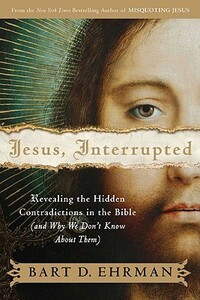Take a photo of a barcode or cover
144 reviews for:
Jesus, Interrupted: Revealing the Hidden Contradictions in the Bible & Why We Don't Know About Them
Bart D. Ehrman
144 reviews for:
Jesus, Interrupted: Revealing the Hidden Contradictions in the Bible & Why We Don't Know About Them
Bart D. Ehrman
The first thing to know about Bart Ehrman is that you should ignore the titles of his books. I don't know if he comes up with him or if it is his publishers, but I do know that the titles are meant to grab eyeballs. The books are much less sensationalistic than the titles or the publisher's blurbs -- Ehrman mostly covers academically mainstream, vanilla views of the Biblical as a historical and literary text. These books, like pretty much anything that looks at the Bible as a historical and literary work, are going to be unpleasant for literalists.
The second thing to know about Ehrman is that he is one of those authors whose books cover the same topic repeatedly from different perspectives. Thus, you probably only need to read one Ehrman book to get the general gist of what he has to say. The other books give more depth for those interested in that.
Jesus, Interrupted has a wide scope. It covers the history of the Biblical text, questions of authorship, historicity, and the much richer views of the Biblical texts that arise if each text is allowed to speak with its own voice instead of being forced to synthesize with the other texts.
I would strongly recommend this book to anyone interested in gaining more background on the Bible. In addition to having better content than some of Ehrman's other books, Jesus Interrupted has a better style. One particularly nice improvement is that in this book, Ehrman started using a method that encourages more discovery by the reader. Instead of saying, for example, that certain passages are incompatible, Ehrman encourages the reader to place the two passages side-by-side and compare them. It's a fun technique.
The second thing to know about Ehrman is that he is one of those authors whose books cover the same topic repeatedly from different perspectives. Thus, you probably only need to read one Ehrman book to get the general gist of what he has to say. The other books give more depth for those interested in that.
Jesus, Interrupted has a wide scope. It covers the history of the Biblical text, questions of authorship, historicity, and the much richer views of the Biblical texts that arise if each text is allowed to speak with its own voice instead of being forced to synthesize with the other texts.
I would strongly recommend this book to anyone interested in gaining more background on the Bible. In addition to having better content than some of Ehrman's other books, Jesus Interrupted has a better style. One particularly nice improvement is that in this book, Ehrman started using a method that encourages more discovery by the reader. Instead of saying, for example, that certain passages are incompatible, Ehrman encourages the reader to place the two passages side-by-side and compare them. It's a fun technique.
After reading Misquoting Jesus and listening to an entire New Testament History course on iTunesU from Yale, this book was mostly a review of things I had previously learned. However, since I read this in print, and had listened to the audio version of Misquoting Jesus, I did process it differently, and learned how to spell many of the names I had never before seen in print (e.g. Marcian, which I had previously thought of as Martian).
The chapter I gained the most from was Chapter 5: Liar, Lunatic, or Lord? Finding the Historical Jesus. In this chapter, Ehrman goes beyond reciting the standard theories about the New Testament and the life of Jesus, and presents some of his own unique theories.
I also appreciated the final chapter, Chapter 8: Is Faith Possible? Ehrman admits to being agnostic, but describes how several of his minister friends reconcile historical criticism of the Bible with their own personal faith. I loved the last paragraph in the book, and it's worth sharing here:
The chapter I gained the most from was Chapter 5: Liar, Lunatic, or Lord? Finding the Historical Jesus. In this chapter, Ehrman goes beyond reciting the standard theories about the New Testament and the life of Jesus, and presents some of his own unique theories.
I also appreciated the final chapter, Chapter 8: Is Faith Possible? Ehrman admits to being agnostic, but describes how several of his minister friends reconcile historical criticism of the Bible with their own personal faith. I loved the last paragraph in the book, and it's worth sharing here:
Even those of us who do not believe in the Bible can still learn from it. It is a book that deserves to be read and studied, not just as a document of faith but also a historical record of the thoughts, beliefs, experiences, activities, loves, hates, prejudices, and opinions of people who stand at the very foundation of our civilization and culture. It can help us think about the big issues of life--why we are here, what we should be doing, what will become of the world. It can inspire us--and warn us--by its examples. It can urge us to pursue truth, to fight oppression, to work for justice, to insist on peace. It can motivate us to live life more fully while yet we can. It can encourage us to live more for others and not only for ourselves. There will never be a time in the history of the human race when such lessons will have become passe, when the thoughts of important religious thinkers of the past will be irrelevant for those of us living , and thinking, in the present.
I read this too long ago and don't remember much about it. I mostly remember thinking that it was not very good.
This is another great book from Bart Ehrman. His scholarship is incredibly refreshing and opens all kinds of new doors when approaching biblical studies. He puts all of the bible into historical context and shows you the different interpretations, mistakes, and problems in the works of the old and new testament.
Read for research purposes and def got what I needed out of it, but as a stand alone book, I’d say it’s targeting almost exclusively those who’ve been raised as Christians - in which case, I could see this content being revelatory. As a lifelong secularist, though, the page-after-page defense for human authorship of the Bible feels absurd, kinda like a prosecutor getting a thousand witnesses to attest to a crime we’ve already solved.
Absolutely essential reading, for the secular and faithful alike.
The Bible is inarguably one of the most important books to have ever existed. However, the story as many of us have come to know it (or at least how it's widely understood in my neck of the woods, the conservative American South) is one that has attempted to harmonize accounts written at different times, by different people, who had vastly different understandings of the historical Jesus. If we look at each individual account, what events does the author portray? What theological points were they arguing? How does this affect our understanding of the overall narrative?
In a sense, it is precisely *because* of these different viewpoints that the Church has established many of its core doctrines. How did the view of the trinity come to be, when it was never stated in the Bible? How is it that a soul is redeemed, if Jesus says different things in different accounts? Interestingly, early Christians disagreed vehemently on each of these subjects--and each had their own scriptures to back them up, as well.
If this is as interesting to you as it is to me, then scoop this book up ASAP!
The Bible is inarguably one of the most important books to have ever existed. However, the story as many of us have come to know it (or at least how it's widely understood in my neck of the woods, the conservative American South) is one that has attempted to harmonize accounts written at different times, by different people, who had vastly different understandings of the historical Jesus. If we look at each individual account, what events does the author portray? What theological points were they arguing? How does this affect our understanding of the overall narrative?
In a sense, it is precisely *because* of these different viewpoints that the Church has established many of its core doctrines. How did the view of the trinity come to be, when it was never stated in the Bible? How is it that a soul is redeemed, if Jesus says different things in different accounts? Interestingly, early Christians disagreed vehemently on each of these subjects--and each had their own scriptures to back them up, as well.
If this is as interesting to you as it is to me, then scoop this book up ASAP!
Sometimes what the author has to share reveals what conservative scholars keep hidden by omission in teaching, other times it reveals the author’s own biases.
challenging
informative
medium-paced
3.5.
While an awesome read, this book is flawed.
1) Ehrman’s appeals to authority are annoying at best and intellectually dishonest at worst.
2) I was sorely disappointed that he did not engage with any alternative views. Combined, these two factors may mislead readers (especially readers with less of an academic background) to believe that his are the only intelligent views. But this is not always the case; his interpretation is at times overly simplistic and lacks knowledge of cultural nuance.
Still, while I don’t agree with all of his conclusions, I agree with many and he convinced me on many others. His chapter on the formation of the canon was particularly helpful. This chapter alone was enough to make the whole book worthwhile.
Overall, though Ehrman’s tone and approach is tiresome at times, he offers a fascinating, thorough, and helpful presentation of the Bible, Jesus, and Christianity that every Christian ought to be able to engage with. Whether they agree with Ehrman or not, “Jesus, Interrupted” presents some of the best liberal Biblical scholarship that’s out there today.
While an awesome read, this book is flawed.
1) Ehrman’s appeals to authority are annoying at best and intellectually dishonest at worst.
2) I was sorely disappointed that he did not engage with any alternative views. Combined, these two factors may mislead readers (especially readers with less of an academic background) to believe that his are the only intelligent views. But this is not always the case; his interpretation is at times overly simplistic and lacks knowledge of cultural nuance.
Still, while I don’t agree with all of his conclusions, I agree with many and he convinced me on many others. His chapter on the formation of the canon was particularly helpful. This chapter alone was enough to make the whole book worthwhile.
Overall, though Ehrman’s tone and approach is tiresome at times, he offers a fascinating, thorough, and helpful presentation of the Bible, Jesus, and Christianity that every Christian ought to be able to engage with. Whether they agree with Ehrman or not, “Jesus, Interrupted” presents some of the best liberal Biblical scholarship that’s out there today.
Ehrman doesn't include anything that a person interested in the history of Christianity wouldn't discover on the internet in short order, but this book does provide a convenient and entertainingly written package for some of the more well known contradictions found in the New Testament, as well as an interesting inside perspective on the gap between what scholars, including the clergy, believe and what is taught to the average churchgoer by those same clergy.




